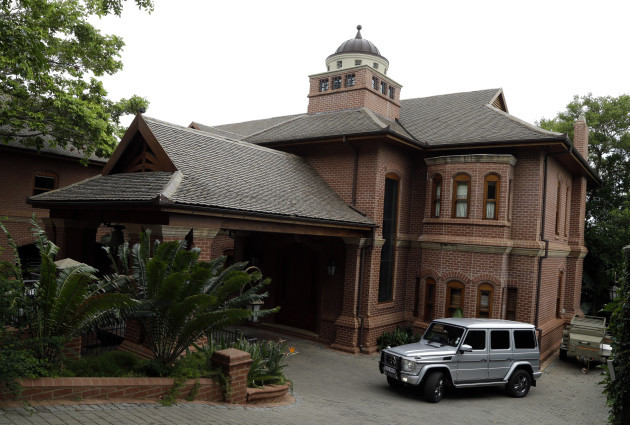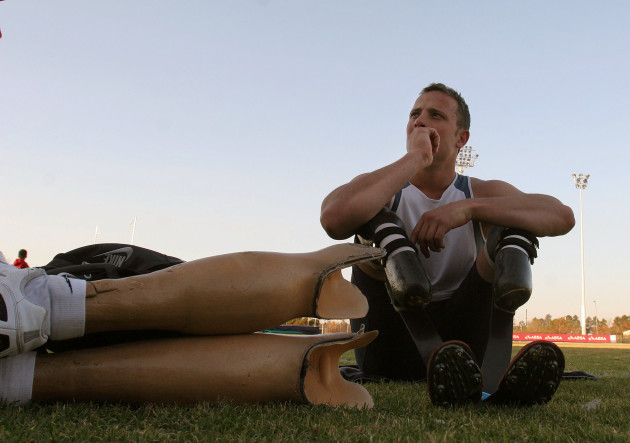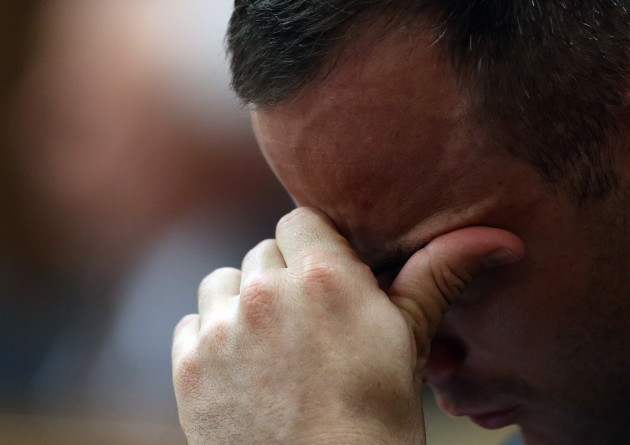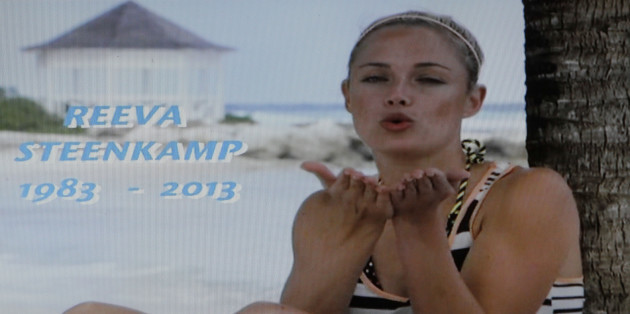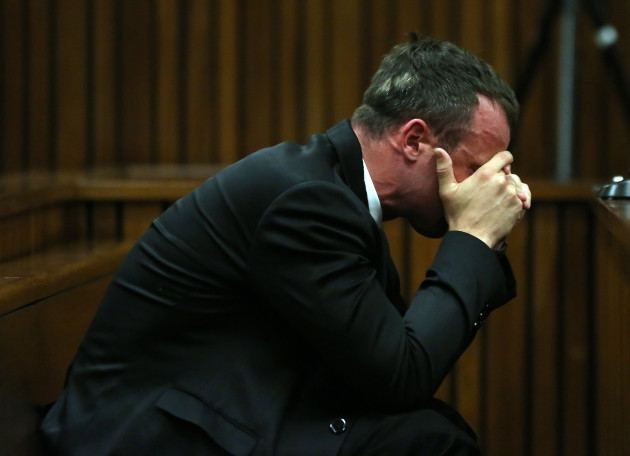No matter how much you change, you still have to pay the price for the things you’ve done. So I got a long road. But I know I’ll see you again – this side or the other.”Doug MacRay, The Town.
ON THE 13TH February 2013, Oscar Pistorius retweeted a message from the M-Net Movie Twitter account. The previous month, he had been signed up by the South African channel as an ambassador for their ‘Every Night is Oscar Night’ television campaign.
That night, the film being aired on the network was The Town, the action-drama starring Ben Affleck as Doug MacRay, a melancholy Bostonian who had thrown away a promising sports career for a life of crime and regret instead.
No one knows for sure if Pistorius was tuning in.
In his testimony, he revealed he was watching TV in his bedroom at around 10pm, as his girlfriend – the model Reeva Steenkamp, was doing some yoga.
When she finished, according to Pistorius, she got into bed alongside him and the pair fell asleep.
Like so much of the Pistorius case, we’re left to speculate on the details. If he had been watching, the irony of him glued to a major Hollywood production before drifting off is irresistible.
Hours later, he found himself the lead character in his own.
Coming up on three years later, the story still doesn’t have an ending. It seemed that Pistorius, like Affleck’s character MacRay, would merely disappear and slip into the background somewhere, having served a punishment of sorts.
In October 2014, he was sentenced to five years in prison for the ‘culpable homicide’ of Steenkamp in the early hours of Valentine’s Day. He had fired four bullets through a bathroom door, allegedly thinking an intruder was behind it. Instead, it was his partner of three months.
After a relentless, tedious but absorbing trial, Judge Thokozile Masipa acquitted Pistorius of two murder charges, saying:
The state has not proved beyond reasonable doubt that the accused is guilty of premeditated murder. There are just not enough facts to support such a finding”.
But just a year later, Pistorius was released from prison, to serve the rest of his sentence under house arrest at his uncle Arnold’s sprawling, luxury home. There was plenty of outrage, plenty of exasperation but an air of resignation too. A famous face, another celebrity being treated differently from the rest.
Prosecutors had one more ace in the pack though – an appeal. And it was there, in yet another courtroom earlier this month, that Pistorius was charged with the murder of Reeva Steenkamp and now faces fifteen years behind bars. Again. He has been bailed and will appeal to the country’s Constitutional Court.
It could be many more months before we get an ending.
John Carlin spent a year-and-a-half meticulously studying Pistorius, his family and confidantes before studiously watching everything unfold from close-in. His book, Chase Your Shadow: The Trials of Oscar Pistorius, paints a picture of a difficult and complicated figure. The case itself, Carlin feels, is almost a metaphor for Pistorius himself.
“I’ve dealt with major, national political questions – things with an unfathomable complexity”, he says.
“But in terms of a particular character, I don’t think I’ve come across anybody who’s posed more challenges to try and get a handle on as Oscar Pistorius. He is definitely exceedingly complicated.
I spent close to a year before the trial looking at his character and talking to loads of people, including himself and his close family. He’s someone who is very messed-up, he has at least two, possibly three, different personalities and is a man of absolute extremes. He is absolutely driven, persevering, courageous – in terms of him overcoming his physical limitations and achieving, almost, the unimaginable feat of running at the Olympic Games. But on the other hand, he’s extremely insecure, vulnerable, fearful.
He is also absolutely courteous, terribly polite and soft-spoken. And on the other hand, he has these attacks of raging, utterly-disproportionate anger.”
Word filtered through to Pistorius’ camp about Carlin’s research. He had travelled the world to track down key figures from Pistorius’ past, including the engineer who fitted his first prosthesis. It was clear that the book wasn’t an exposé but a careful examination of the facts. It gained Carlin access to the inner sanctum. And it brought him face-to-face with Pistorius on a couple of occasions.
“The first time I met him, I saw that twin-personality thing right in front of my eyes,” Carlin remembers.
At first he was just like a little wounded child, sitting in front of me with his head resting on his aunt’s shoulder, like a four-year-old that has found out his puppy has died or something. And I was worried that I wasn’t going to get through to him at all. And he was like that for about half an hour and then, suddenly, he changed. I must have won his confidence in some way and he said ‘Why don’t we go out and have lunch?’ and suddenly he’s back to being the confident, celebrity-athlete and we go out to this nice, big Audi car and drive down to a restaurant and we’re sitting there talking, just like, I’d imagine, we’d have talked before he’d killed Reeva Steenkamp. We talked about food, we talked about Spain – where I used to live – and then, suddenly, he’d check himself and would be repentant, as if he’d just remembered his predicament. And he’d look away into the distance and completely remove himself.
He took me back to this cottage, within his uncle’s vast premises, where he was living at the time. To my absolute amazement, the first thing I see, looming over the room, is a framed photograph of Reeva Steenkamp in all her mysterious beauty. It was a really bizarre moment.”
It was a bizarre trial, really. A spectacle played out on television. With the world’s media assembled, there was 24-hour rolling coverage. At night, there was a compilation of the day’s ‘best bits’ from the courtroom. There were body language experts, psychologists, psychiatrists but the joke was on all of them. On all of us. Because nobody knew anything. We knew what we thought and what we felt. We had already chosen sides. And as a result, Carlin says, the entire thing played out like a kind of sports event.
“From the point of view of millions of spectators around the world, it was very much like a boxing match. The vast majority watching had made up their minds about where they stood – either Pistorius was utterly guilty of deliberate murder or he fell foul of what ended up being a tragic accident. So people began with a clear position and so every time the prosecutor, Gerrie Nel, landed a punch, the crowd would celebrate as if he’d got him right on the jaw. And if you were on the other side, any time Barry Roux did similar, there would be more celebrations. In terms of the way it was covered on TV, you had the action replay. You had the analysts and the experts in a studio giving you the blow-by-blow commentary. And in the end, when the judge gave the verdict on points, one side celebrated and the other was filled with gloom. It was very much seen in that sporting way – which, of course, meant a certain frivolity.”
When the initial verdict came down, Carlin was disappointed but understood why Mapisa reached the conclusion she did. There was a lack of anything clear-cut. Ultimately, the judge had to try and base a decision around what she thought was going on in Pistorius’ mind when he pulled the trigger.
“When I first heard he had killed Reeva Steenkamp, my initial reaction was the same as most people around the world, namely that he had obviously killed her deliberately and that, obviously, the story about the intruder was absolute rubbish. But when I started on the book, I had to clear my brain of any prejudice and start with a clean slate. And it was with the same spirit I approached the trial. Any honest assessment of the evidence had to lead you to a sense of the absolute murkiness of the whole story and the impossibility of anyone, really, honestly, putting their hand on their heart and stating categorically that they knew happened that night. I’m quite certain that the judge herself, privately, did not know either way. The one thing I think wasn’t murky was that on the basis of the evidence presented by the prosecution, you could not conclude that Pistorius had deliberately killed Reeva Steenkamp.”
There was much speculation afterwards that there was preferential treatment, that Pistorius’ celebrity or skin colour or influence or all those things had resulted in a lenient sentence. Carlin feels such conspiracy theories are baseless, given the evidence of other similar cases.
“I wrote a story some months ago about another case in South Africa that happened about a year before Pistorius shot Reeva Steenkamp”, he says.
“It was about a black guy who woke up in the middle of the night, heard a noise in the bathroom, grabbed a gun by his bedside, moved stealthily towards the bathroom, fired through the door and killed his wife. The verdict in that case was culpable homicide but he only got a suspended sentence – he never had to do any time in jail. So that story debunks the notion that Pistorius, because of his celebrity, or even more ridiculously because he’s white, which is absurd given the judge was black, that he got some preferential treatment.”
My misgivings are about the length of the original sentence,” Carlin continues.
“She (Mapisa) had quite a lot of discretion and she gave him a sentence that was at the lower end of the spectrum. Having said that, it was entirely in accordance with South African law that he should’ve been released when he was released. But there was no great injustice or preferential treatment that Pistorius got in being released because you’ll find countless cases of South African criminals who have experienced the same thing.
I gotta die six times before I get out of here; but I’ll see you again – this side or the other”Stephen MacRay, The Town.
There’s the famous quote from John Lennon about how Elvis really died the day he joined the US Army in 1958, that afterwards he was never the same.
Did ‘Oscar Pistorius’ die along with Reeva Steenkamp on Valentine’s Day 2013?
“God almighty, if ever there’s a watershed moment in a person’s life, that’s it,” Carlin says.
“I think what was destroyed that night was the heroic persona that he spent all of his life building. At the London Olympics and Paralympics, he became a global superhero, an almost God-like figure. He had always presented himself as an elegant, polished person, very much in command of himself. And what it did was shatter, in the most tragic and dreadful way possible, the whole statue of himself that he’d built over the years. What we’ve seen instead is the sad, traumatised infant - which, in a way, he always was.”
A substantial part of Carlin’s book is about legal truth versus ‘truth truth’, that ultimately, in the Pistorius example, what has happened in court has been based around a best guess.
In a similar way, the sentence that Pistorius ends up receiving will have an expiry date. But that’s not to say his punishment will.
“The legal punishment is one thing and is tied to the legal truth – it’s inevitably limited. Whatever the legal punishment may be, the ‘punishment punishment’ is that he’ll be traumatised by this, suffering – whatever happened that night. He’ll be suffering, mostly tortured until the day he dies. And he will always live with the knowledge that he killed Reeva and he also destroyed his own life – a life he struggled for so long to create. He will mostly be viewed by people as a pariah and all the fame, all the wealth and all the riches that were poised to be given to him, assuring him of a happy and long life, have been snatched away.”
Of course, he’s not the only one dealing with the continued trauma.
In August, Reeva Steenkamp’s parents gave an emotional television interview to Australia’s Channel Seven. Addressing Pistorius directly, Steenkamp’s mother June said:
“All I want you to realise is that you have ruined our lives. You’ve taken her life, her possible marriage, or having a baby – our grandchild. You’ve taken her career away… You’ve taken the most precious thing out of our lives.”
Barry, Reeva’s father, discussed the possibility of a successful appeal but admitted that even an upgraded murder charge wouldn’t change much.
“If the outcome is going to be a longer sentence, are we going to feel better? I don’t know. All we want is the truth to come out in the real justice side of the whole scenario.”
It’s a long-shot. Carlin remains convinced that the events leading up to the moment Reeva was shot and killed by Pistorius will remain shrouded in conjecture.
“So many people have asked me, ‘What do you think – did he kill her deliberately?’ and my answer is always the same: I cannot, in all honesty, answer that question categorically and I don’t think anyone will ever be able to.
I knew there was no way that the appeals court were going to answer the six million dollar question that everybody wanted to know – namely, did Oscar Pistorius kill Reeva Steenkamp intentionally or not? That will remain, legally speaking, forever a mystery.
What the Pistorius camp is clinging to is that in the end, what both the trial judge and the appeals court judge have purported to do is try and get inside Pistorius’ head during those fateful moments and came to different conclusions. In the end we’ll never know for sure, hence another appeal in the Constitutional Court. It’s not quite a throw of the dice but, my goodness, it’s a complicated business.”
Earlier this month, we learned some new details about Pistorius – that he could only manage £433 of a bail payment because he has no money left and that he’s studying a business with law degree at a London university.
“Clearly doing this law degree is, from his point of view, an intelligent thing,” says Carlin.
“It gives his life a certain focus and a purpose and forces him out of this state of limbo and despair which he is also in. Before the court trial, he was in a terrible, terrible state and was, according to his family, suicidal. I’d be very surprised if those thoughts are still not flipping through his head these days as he contemplates spending many, many more years in jail.
He’s probably clinging to the hope that the constitutional court will come to the rescue and, of course, he’s got a record of this – going back in his athletic’s career and the whole legal proceedings concerning whether he could run at the Olympic Games or not. He eventually won that after doggedly pursuing all kinds of legal avenues and maybe he’s thinking that this is still possible. His mindset is that he can overcome obstacles – in a way, it’s the story of his life.
But once it hits him, which I think is likely, that the constitutional court is not going to find in his favour and he contemplates many, many more years in jail, I think he’s going to sink, yet again, into the deepest, darkest despair and no London university degree or anything will be able to help him.”
For Pistorius, his long road has no end in sight.
Chase Your Shadow: The Trials of Oscar Pistorius is published by Atlantic.
This article was originally published on 25th December 2015.

